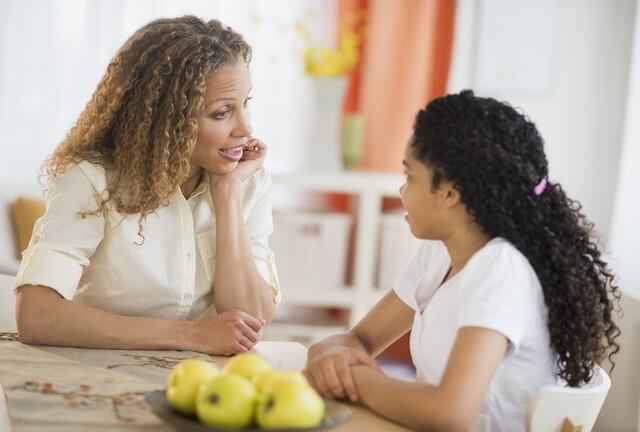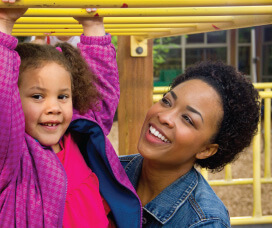By Rosalind Sedacca, CDC Most parents don't know how to talk to their children. It's one of the underlying reasons for parent-child communication, respect and trust issues within the family dynamic. You wouldn't think one would need to be reminded to talk to your children. Unfortunately, many parents need just such a reminder -- especially in today's mega-paced culture in which just sitting down to a family dinner together seems to be a major accomplishment. Too often busy parents find themselves talking "at" their children, but not "to" them. And most especially, not "with" them. This, of course, is problematic in any family trying to raise socially, emotionally and spiritually healthy children. However, it is especially dangerous if that family is facing the challenges of divorce or separation. If your parent-child communication skills and rapport is not optimal before discussions about divorce or family lifestyle changes come up, the likeliness
Read More
By Rosalind Sedacca, CDC During and after divorce your children may be hyper-sensitive about many things. What may have formerly been routine conversations, questions or activities can now be touchy subjects fraught with anxiety, resentment or ager. This is understandable when you consider that the stability of the world they knew has been dramatically altered. Minor insecurities can easily grow into major problems. Children may regress in their behaviors and skills. Some become more clinging – others more aloof – depending on their adaptability and perspective about the divorce. This is the time to focus on good parent/child communication. You can reinforce or rebuild trust, security and confidence that things will be okay again – despite the changes inflicted by your divorce. Here are some solid tips for more effective communication with your children. Master them today and they will work on your behalf for years and
Read More
Communication with your child is essential. By Rosalind Sedacca, CDC It’s no secret that one of the biggest challenges a parent faces after divorce is staying in good communication with your children. All parents struggle with communication issues as their children grow. However, children who have had their lives dramatically altered by separation or divorce need even more attention. Plus, diligent and consistent observation by their parents. Children tend not to tell you when they are angry, resentful, confused, hurt or depressed. Instead, they reflect their problems through their behavior. Often they will act out. Other kids may regress or turn inward in ways that you have not experienced prior to the divorce. Take time to see the world through your children’s eyes. You will be better able to meet their needs and understand their confusion or aggression. Then you can find appropriate ways to resolve
Read More
Divorced parent communication with your child is essential. By Rosalind Sedacca, CDC When you’re a divorced parent, effective communication with your children is more important than ever. Which means honing your communication skills so you’re connecting with love, respect and compassion. Candid divorced parent communication opens the doors to a healthier, more positive relationship with your kids. It makes you more sensitive to issues of concern early on so you can nip them in the bud. It encourages your children to talk about what they are feeling. It addresses their questions and situations that are creating conflict for them. How to open the conversation so you’re not shut down! Don’t sit down and say, let’s talk. Find comfortable times and places where conversation can flow naturally and easily. Then bring up related subjects in a casual way. Watching TV or movies at home can often be
Read More
parenting after divorce By Rosalind Sedacca, CDC Sadly, divorce is a time when we experience disconnection. We disconnect from our former spouse. Too often we often have to disconnect from time spent with our children as well. That’s why it is important for you to strengthen your bond with your children. Find ways of strengthening or at least maintaining your connections during this challenging period of transition. This is equally true, when you are living with your children as well as when you are apart. That’s the basis of a Child-Centered Divorce. Children want and NEED to know they are still loved, valued and cared about. Show them, tell them and keep in close communication with them – during the happy times and the sad ones. They need to feel they have a safe place to turn, a shoulder to cry on and a non-judgmental ear
Read More
By Rosalind Sedacca, CDC Sadly, divorce is a time when we experience disconnection. We disconnect from our former spouse. Too often we often have to disconnect from time spent with our children as well. That’s why it is important for you to strengthen your bond with your children. Find ways of strengthening or at least maintaining your connections during this challenging period of transition. This is equally true, when you are living with your children as well as when you are apart. That’s the basis of a Child-Centered Divorce. Children want and NEED to know they are still loved, valued and cared about. Show them, tell them and keep in close communication with them – during the happy times and the sad ones. They need to feel they have a safe place to turn, a shoulder to cry on and a non-judgmental ear when they need it. If divorce has
Read More
By Rosalind Sedacca, CCT What do you recommend when the other parent tells your children not to tell you what goes on in their house? Great question! You’re not alone in asking about this and it’s not an easy one to answer. After divorce most parents want to keep their private lives private and don’t want the children sharing too many details about their visit time. Asking children to “spy” on their other parent puts the kids in an awkward situation. They feel guilty, pressured and confused, especially if Mom or Dad tells them not to share specific information. This delicate subject needs to be addressed between both parents and agreed upon in advance. Children should be able to share something about activities or other innocent details regarding their time with their other parent. Asking not to say anything is unfair to the children who naturally want to talk about
Read More










